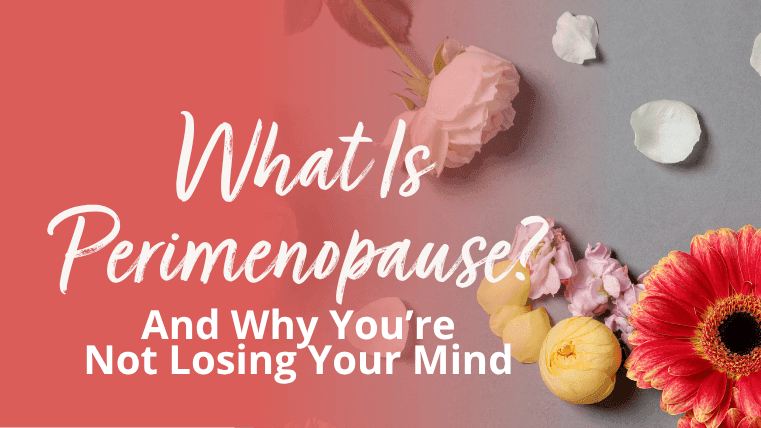
What Is Perimenopause?
And Why You’re Not Imagining Your Symptoms
You’re waking up at 3 a.m. again.
Your moods have a mind of their own.
Your favorite jeans suddenly don’t fit.
If you’ve ever thought, “Is this perimenopause?”—you’re not alone. Spoiler: It probably is.
As a Master Nutrition Therapist and Women’s Wellness Coach with over 15 years of experience, I get this question almost daily: “What is perimenopause—and why do I feel so off?”
Let’s break it down without shame or confusion. Because you deserve real answers—and real relief.
So, What Is Perimenopause?
Perimenopause is the transition before menopause, when your hormones—especially estrogen and progesterone—start to fluctuate.
It can begin as early as your mid-30s and last anywhere from 4 to 10 years before you reach menopause (defined as 12 consecutive months without a period).
Menopause is finally becoming part of the mainstream conversation.
However, perimenopause remains a quiet, often misunderstood phase. And despite what you’ve been told, it’s not just about hot flashes.
Instead, it’s a full-body experience that can affect:
- Sleep
- Mood
- Energy
- Memory
- Digestion
- Metabolism
Common Symptoms of Perimenopause:
- Fatigue: Not just tired—hormonal shifts (especially cortisol) can wipe out your energy.
- Weight Gain (especially belly fat): Lower estrogen and higher cortisol slow your metabolism and increase fat storage.
- Mood Swings & Anxiety: These are linked to fluctuating estrogen and progesterone, which impact neurotransmitters like serotonin and GABA.
- Sleep Disruptions: Waking at 2–3 a.m? That’s likely due to drops in progesterone and melatonin.
- Brain Fog: Trouble focusing or remembering names? Hormones impact cognitive clarity.
- Irregular or Heavy Periods: Ovulation becomes less consistent, which makes periods erratic—or overwhelming.
- Bloating & Digestive Issues: Estrogen affects gut motility, inflammation, and your microbiome.
- Hot Flashes & Night Sweats: Yes, these can begin well before menopause itself.
You’re not “too young.” You’re not “just stressed.” These are real hormonal changes.
Want to Know Exactly What’s Going On? I offer functional hormone testing using the DUTCH test—a simple at-home lab that provides deep insights into your hormone levels, cortisol patterns, and more.
Click here to learn more about the DUTCH Hormone Test.
What You Can Start Doing Today to Feel Better
You don’t need to overhaul your life. These five practices offer real support without extremes:
- Eat balanced meals—no skipping or caffeine crashes
Balances blood sugar, calms cortisol, and reduces cravings and mood swings. - Prioritize sleep and nervous system support
Quality rest boosts hormone repair and supports melatonin and progesterone. - Incorporate yoga, breathwork, or movement that feels good
Helps regulate stress and boosts feel-good neurotransmitters like serotonin. - Support your metabolism with real food and gentle routines
Nourishes your thyroid, stabilizes insulin, and helps your body use fuel efficiently. - Give yourself grace—this is a season, not a life sentence
Self-compassion lowers chronic stress, which helps hormones rebalance.
Ready to Feel Like Yourself Again?

Feeling drained, moody, or stuck with stubborn weight gain? You don’t have to figure it out alone.
I’m Jessica Lee Reader, a Master Nutrition Therapist and Yoga Teacher with 15+ years of experience helping women in perimenopause and menopause restore energy, mood, and metabolism with holistic nutrition and nervous system support.
Book your free 15-minute consultation, and let’s talk about your symptoms and how I can help you.
